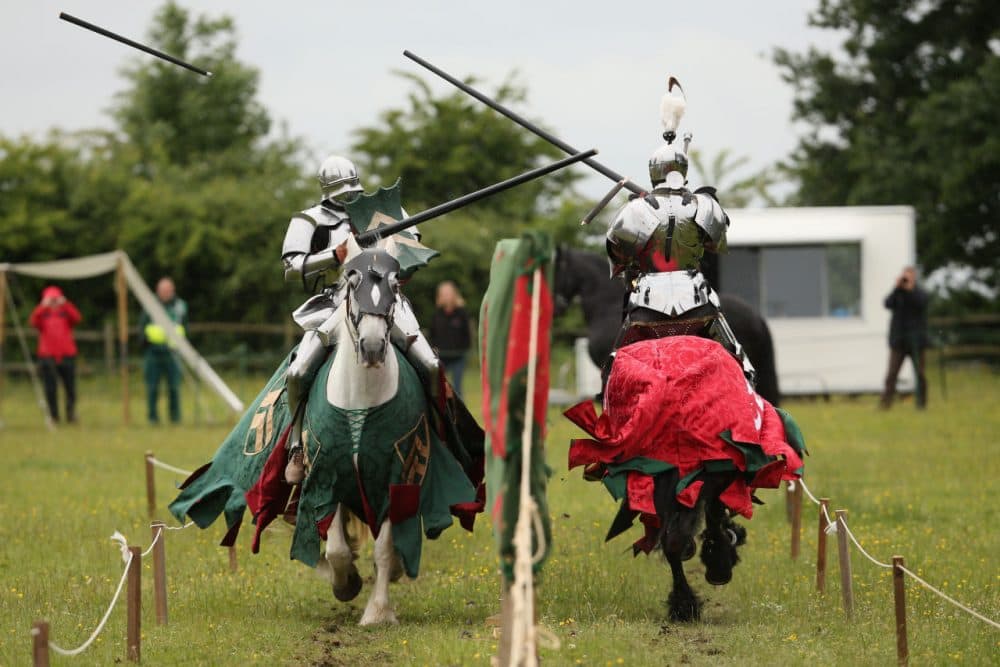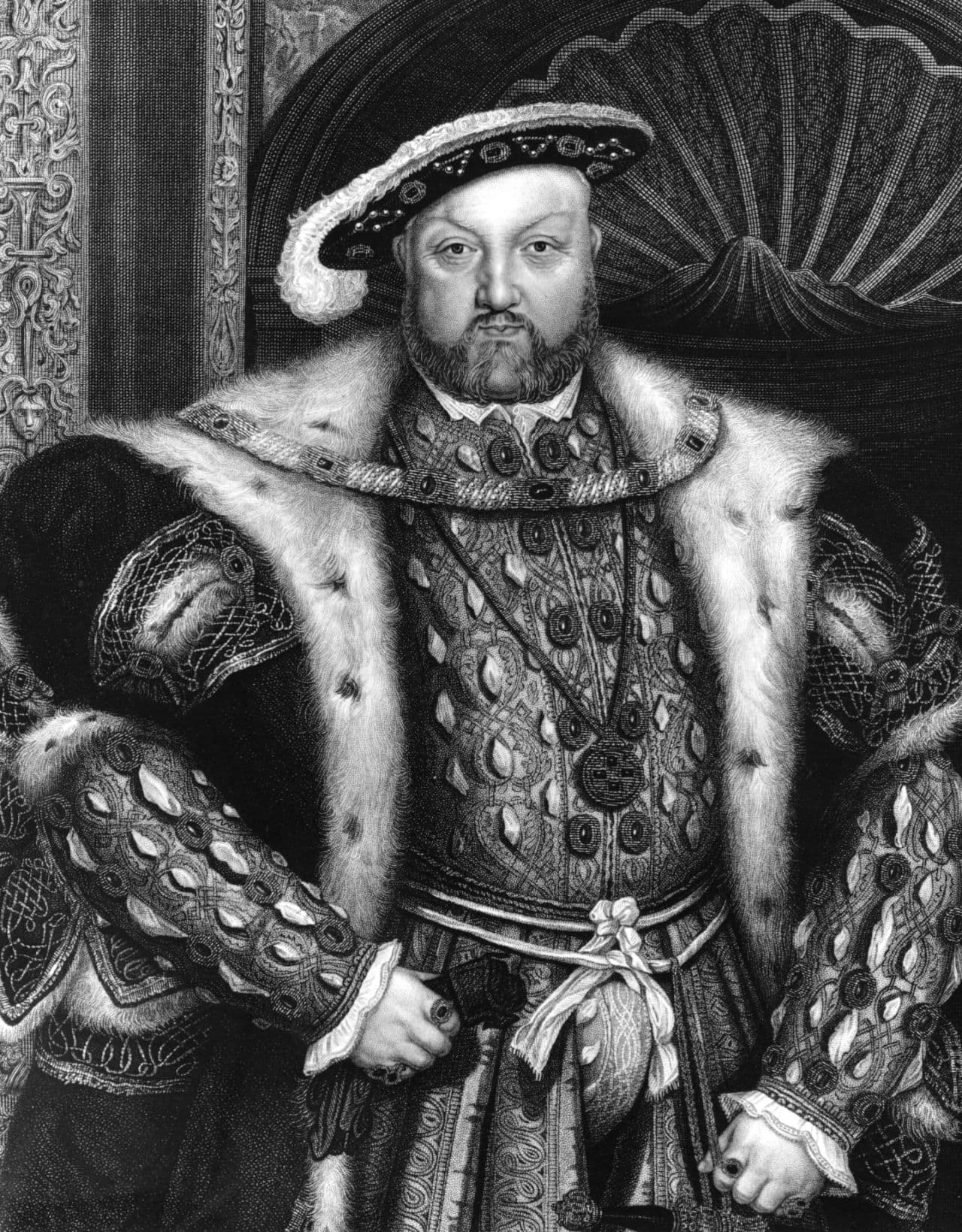Advertisement
King Henry VIII Might Have Had CTE
Resume
A listener recently noted that without context, stories about former NFL players who’d been diagnosed with brain damage associated with multiple blows to the head seem incomplete. Fair enough. Because chronic traumatic encephalopathy may have also been apparent among butchers, bakers, and candlestick makers. Among beggars and…
He was unhorsed. He was dazed. But he wasn’t taken out of play, so to speak, and he continued to joust for the rest of the day.
Arash Salardini, Yale neurologist
King Henry VIII.
"He’s worthy of remembering," says Dr. Suzannah Lipscomb of the New College of the Humanities in London, "because he’s so important in the history of breaking the church in England from that of Rome, in establishing a navy, which is really important to the creation of the British Empire. But I think he’s most of all remembered for the fact that he had six wives and killed two of them."
Lipscomb is an authority on the handsome young man who ascended to the throne of England in 1509. She wrote a book titled, "1536: The Year That Changed Henry VIII."
"So before 1536," Lipscomb says, "Henry VIII was famed for being good-looking. He could play a number of musical instruments. He could speak a number of languages."
He wrote books, too, and he was a popular king, at least among those not inclined to cross him.
Injured Royalty
But in that fateful year of 1536, King Henry, who enjoyed jousting, among other sports, suffered an injury that temporarily disabled him and scared the heck out of those dependent on his favor. Arash Salardini, a behavioral neurologist at the Yale School of Medicine, has developed that injury and its aftermath into a case study for his students.
"In 1536, he fell off his horse," Salardini explains. "But also the horse lost his footing and fell on top of him. And he was said to have been 'without speech for two hours,' which we can interpret it to mean that he was unconscious."
History tells us that jousting had humbled the King before. Back in 1524, he’d taken a lance to the face when he’d neglected to close his visor.

"And he was unhorsed. He was dazed. But he wasn’t taken out of play, so to speak, and he continued to joust for the rest of the day," says Salardini.
So it went in jousting’s pre-concussion protocol days.
Anyway, by all accounts it was the second jousting mishap that marked the onset of King Henry’s erratic behavior.
"He seems to be much more paranoid," Lipscomb says, "much more irritable and fickle. He has his chief minister, Thomas Cromwell, who’s been his close companion and who's been the real architect of The Reformation in England — he has him deprived of his office and then executed. And Cromwell sends Henry a letter from the tower, pleading. And the last line is, 'I cry mercy, mercy, mercy.' But none was forthcoming."
And it got worse. According to some accounts, after an argument involving wife number six, Catherine Parr, Henry sent her to the Tower of London, where the doomed awaited execution. Bad enough that he should do that. Worse, certainly, that shortly thereafter he forgot that he’d done it.
"When somebody reminded him, he remembered the incident," says Salardini.
Making The CTE Connection
That behavior might in part be explained by Henry’s vexing troubles with the Pope and run-of-the-mill court intrigue, real and imagined, but it made Salardini wonder if King Henry was suffering from the same degenerative condition that’s been discovered in many former NFL players: chronic traumatic encephalopathy.
"This is actually common. This pattern of forgetting is called subcortical pattern of amnesia, and the problem is with retrieval," Salardini explains. "And he seemed to have that particular pattern, which also fits with traumatic brain injury."
I know we’ve been paying a lot of attention to football. ... But there are all sorts of activities that can be associated with these long-term changes.
Ann McKee, Boston University neuropathologist
Salardini says his hunch was inspired by a piece in a scientific journal in 2009, written by Boston University's Ann McKee and Robert Cantu.
McKee has examined the brains of scores of former NFL players. She’s found evidence of CTE in nearly all of them. And she’s not dismissive of Salardini’s belated explanation of King Henry’s erratic behavior.
"No, I don’t think this is frivolous," McKee says, "because this is a major category of disease. I know we’ve been paying a lot of attention to football, because it’s a very popular sport, and because, unfortunately, there’s a lot of concussive and sub-concussive injury that occurs just routinely playing the game. But there are all sorts of activities that can be associated with these long-term changes."
McKee includes a soccer player and a rugby player among those whose brains have shown evidence of CTE, but "it really doesn’t need to be athletics," she notes. "It can be military service. It can be poorly controlled epilepsy."
...And it can be getting whacked in the head a couple of times with a lance while jousting. Or, according to Lipscomb, perhaps it can be.
"The really big problem, as a historian, was that we can’t prove it, either way. So we don’t know, but it sounds plausible. Aristotle says of the old and aged that having been taken and betrayed, they become cynical and suspicious, and that seems to happen to Henry. It seems to me that the brain damage may well be part of it, but there’s a lot else going on as well. So maybe it’s both, you know."
Given that the brain of Henry VIII is unavailable for study, uncertainty is likely to prevail. But would Arash Salardini like to make a career of examining the careers and perhaps the brains of erratic leaders with an eye toward explaining same?
"Well, it would be fascinating," he laughs. "However, the way academia works is that you have to have a molecule, and you need to pursue it most of your life and find a cure for a disease. But, yes, I mean, if I could get grants to do this sort of thing, it would be much more interesting as a career."
If those grants were to come through, Dr. Salardini would perhaps not lack for subjects.
This segment aired on February 13, 2016.
